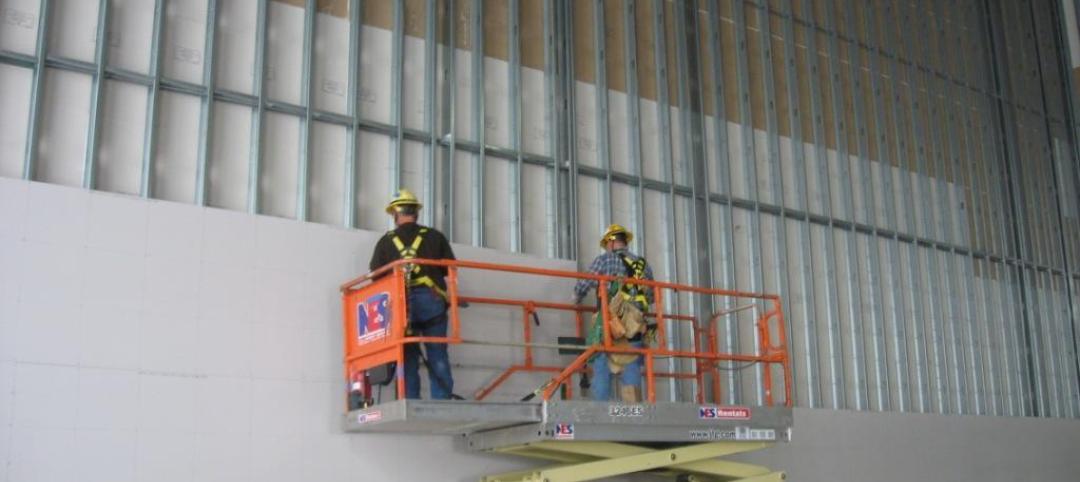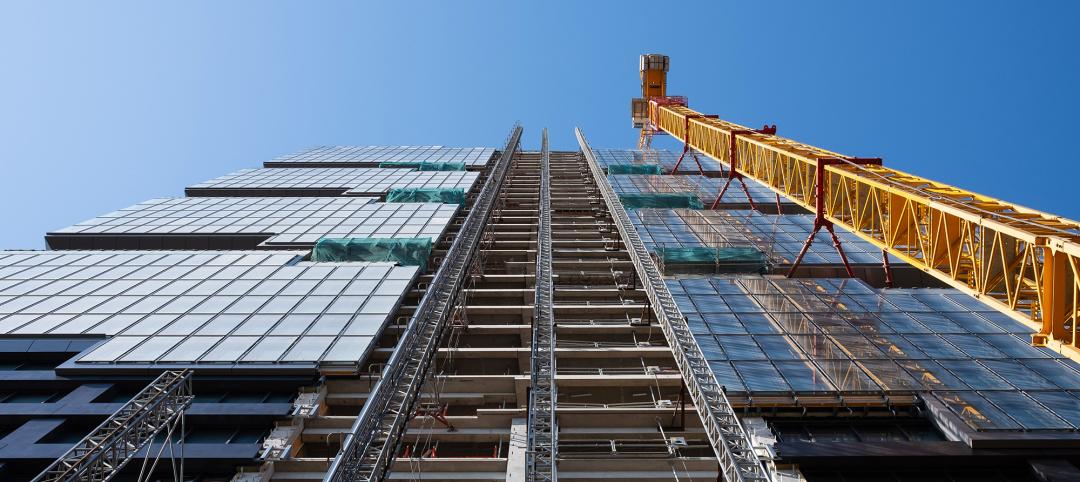Commercial construction is in high demand across the country and contractors are confident in the trajectory of the industry, according to the USG + U.S. Chamber of Commerce Commercial Construction Index (‘Index’), that launched recently. Nearly all contractors surveyed – 96 percent – expect revenues to grow or remain stable this year compared to 2016, with 40 percent expecting an increase and only 3 percent expecting a decrease in revenue.
The Index is a new quarterly economic indicator designed to gauge what drives the commercial construction industry and its leaders, including specific issues like backlog of work, new business pipeline, revenue projections, workforce issues, and access to financing. Given the sector’s importance to the U.S. economy and the outsized role it could play in years to come, the data contained in the Index will be vital to better understanding trends, challenges and opportunities. The research was developed with Dodge Data & Analytics (DD&A), the leading provider of insights and data for the construction industry, by surveying commercial and institutional contractors.
“This first-of-its-kind Index was born out of a need to understand the issues that affect commercial construction. The Index will deliver critical insights into the future health of the industry,” said Jennifer Scanlon, president and chief executive officer of USG Corporation. “USG is committed to providing solutions for our customers in order to help the entire industry make strong contributions to the U.S. economy. Through the Index we are able to identify areas of strength and pinpoint areas of improvement where industry leaders must focus.”
Two-thirds (66 percent) of contractors said they expect to employ more workers in the next six months, indicating growth in a sector that employs approximately 3 million Americans. But 61 percent of Index respondents reported difficultly finding skilled workers. The contractors reported the biggest shortages in the concrete, interior finishes/millwork, masonry, electrical and plumbing trades.
“The commercial construction industry is a vital engine for the American economy,” said Tom Donohue, president and CEO of the U.S. Chamber. “The projected growth uncovered in this research is good news for employers and workers, but there is reason for concern in the lack of qualified talent available in vital specialties. To get our economy growing to its full potential, we must ensure that we have a workforce that is ready to fill the available jobs. Each quarter, this first-of-its-kind research will make us smarter about future challenges and inform solutions for our country’s leaders.”
The report looks at the results of three leading indicators – backlog levels, new business opportunities and revenue forecasts – to generate a composite index on a scale of 0-100 that serves as an indicator of health for the contractor segment on a quarterly basis. The Q2 2017 composite index score was 76, representing continued health in the sector. This composite score is up two points from a 74 in the Q1 survey, driven primarily by a bump in the ratio between actual and ideal backlog. New business and revenue results also saw slight increases quarter-over-quarter.
The composite scores from the three drivers of confidence were:
Backlog: 81, up four points in Q2 over Q1
Contractors’ current average backlog levels represent 81 percent of their ideal backlog levels, up from 77 percent in Q1. On average, contractors currently hold 9.9 months of backlog, while the ideal amount is 12 months.
New Business: 77, up two points in Q2
Nearly all contractors continue to report high or moderate confidence in the market. Well over half of contractors (59 percent) reported high confidence in new business over the next 12 months (up from 51 percent in Q1), indicating a shift to higher levels of confidence among some respondents.
Revenues: 71, up two points in Q2
An overwhelming 96 percent of contractors expect revenues to grow or remain stable in 2017 over 2016. Of those expecting revenue increases, the actual percentage of expected increases varies widely. Forty percent expect revenue increases of 7 percent or more in the next 12 months.
The Index findings are compiled using survey results from contractors within a DD&A panel of more than 2,700 decision makers from across key facets of the commercial construction industry. This first public report was developed using research from previous quarters, which puts into context the state of contractor sentiment in the U.S. building industry.
Related Stories
Self-Storage Facilities | Jan 5, 2024
The state of self-storage in early 2024
As the housing market cools down, storage facilities suffer from lower occupancy and falling rates, according to the December 2023 Yardi Matrix National Self Storage Report.
Urban Planning | Dec 18, 2023
The impacts of affordability, remote work, and personal safety on urban life
Data from Gensler's City Pulse Survey shows that although people are satisfied with their city's experience, it may not be enough.
MFPRO+ News | Dec 11, 2023
U.S. poorly prepared to house growing number of older adults
The U.S. is ill-prepared to provide adequate housing for the growing ranks of older people, according to a report from Harvard University’s Joint Center for Housing Studies. Over the next decade, the U.S. population older than 75 will increase by 45%, growing from 17 million to nearly 25 million, with many expected to struggle financially.
Industry Research | Dec 9, 2023
Two new reports provide guidance for choosing healthier building products
The authors, Perkins&Will and the Healthy Building Network, home in on drywall, flooring, and insulation.The authors, Perkins&Will and the Healthy Building Network, home in on drywall, flooring, and insulation.
Student Housing | Dec 5, 2023
October had fastest start ever for student housing preleasing
The student housing market for the upcoming 2024-2025 leasing season has started sooner and faster than ever.
Industry Research | Nov 28, 2023
Migration trends find top 10 states Americans are moving to
In the StorageCafe analysis of the latest migration trends, each U.S. state was looked at to see the moving patterns of people in the last few years. These are the top 10 states that people are moving to.
Market Data | Nov 27, 2023
Number of employees returning to the office varies significantly by city
While the return-to-the-office trend is felt across the country, the percentage of employees moving back to their offices varies significantly according to geography, according to Eptura’s Q3 Workplace Index.
MFPRO+ News | Nov 21, 2023
Renters value amenities that support a mobile, connected lifestyle
Multifamily renters prioritize features and amenities that reflect a mobile, connected lifestyle, according to the National Multifamily Housing Council (NMHC) and Grace Hill 2024 Renter Preferences Survey.
Industry Research | Nov 17, 2023
Air conditioning amenity sees largest growth in Pacific Northwest region
The 2024 Renter Preferences Survey Report sheds light on the demographics, lifestyle, connectivity needs, and more for the renters of today. At the top of this list—the feature that respondents are “interested in” or “won't rent without”—is air conditioning.
Multifamily Housing | Nov 9, 2023
Multifamily project completions forecast to slow starting 2026
Yardi Matrix has released its Q4 2023 Multifamily Supply Forecast, emphasizing a short-term spike and plateau of new construction.

















